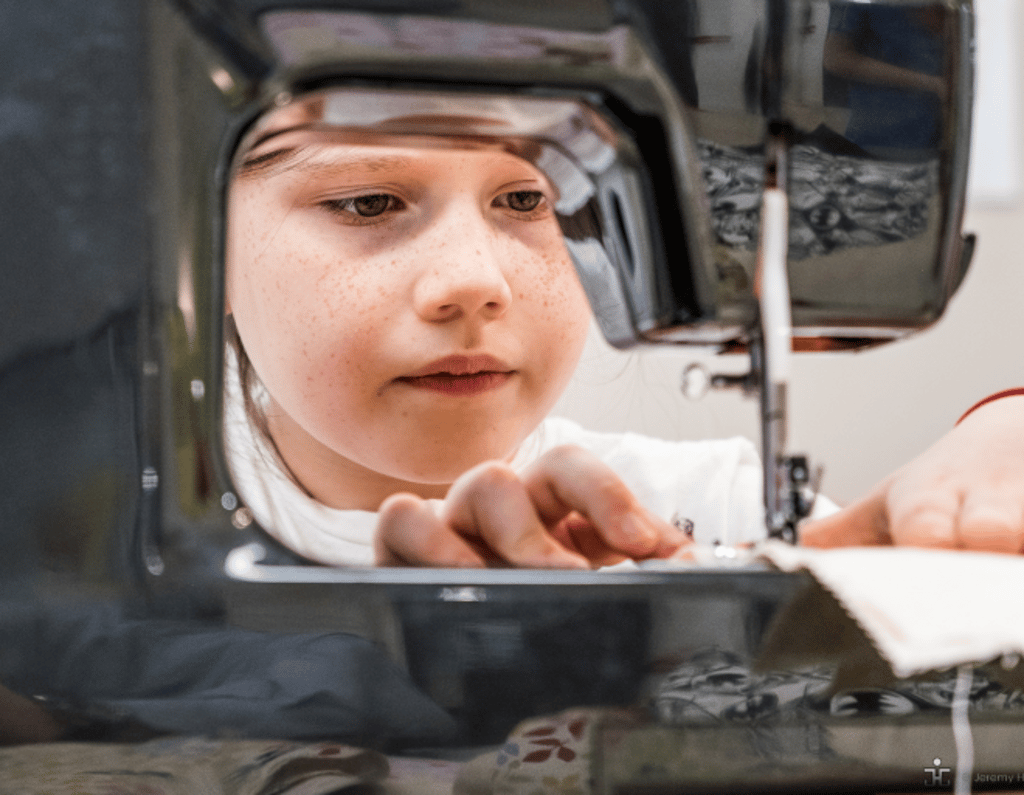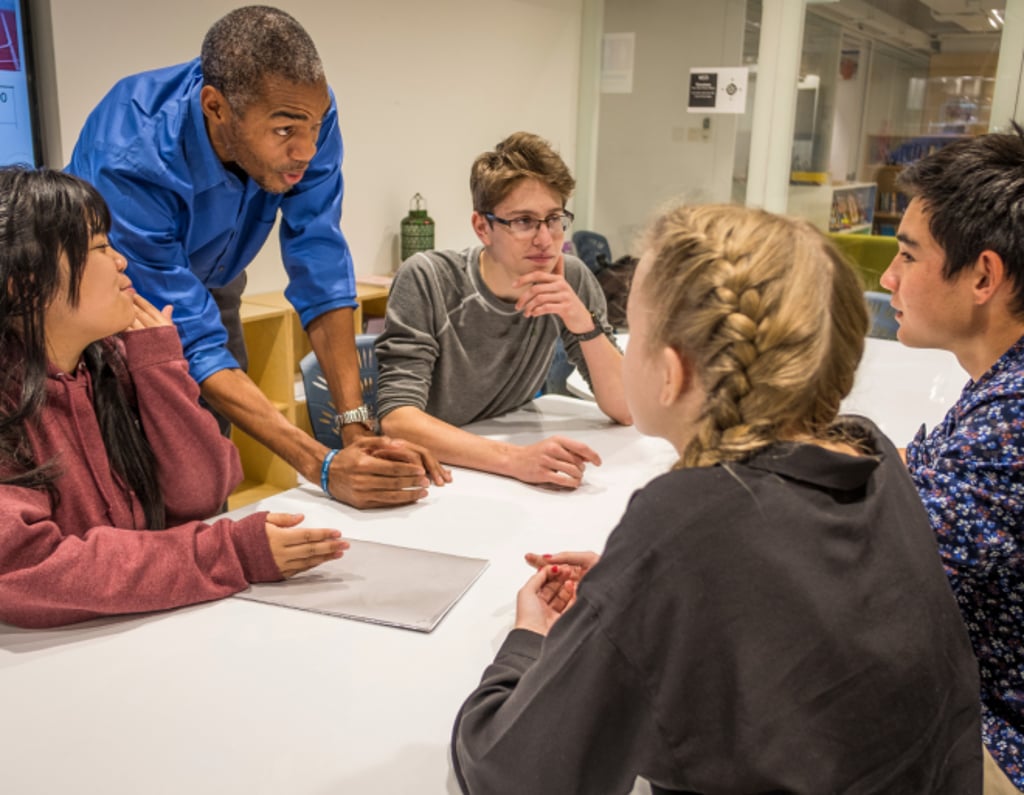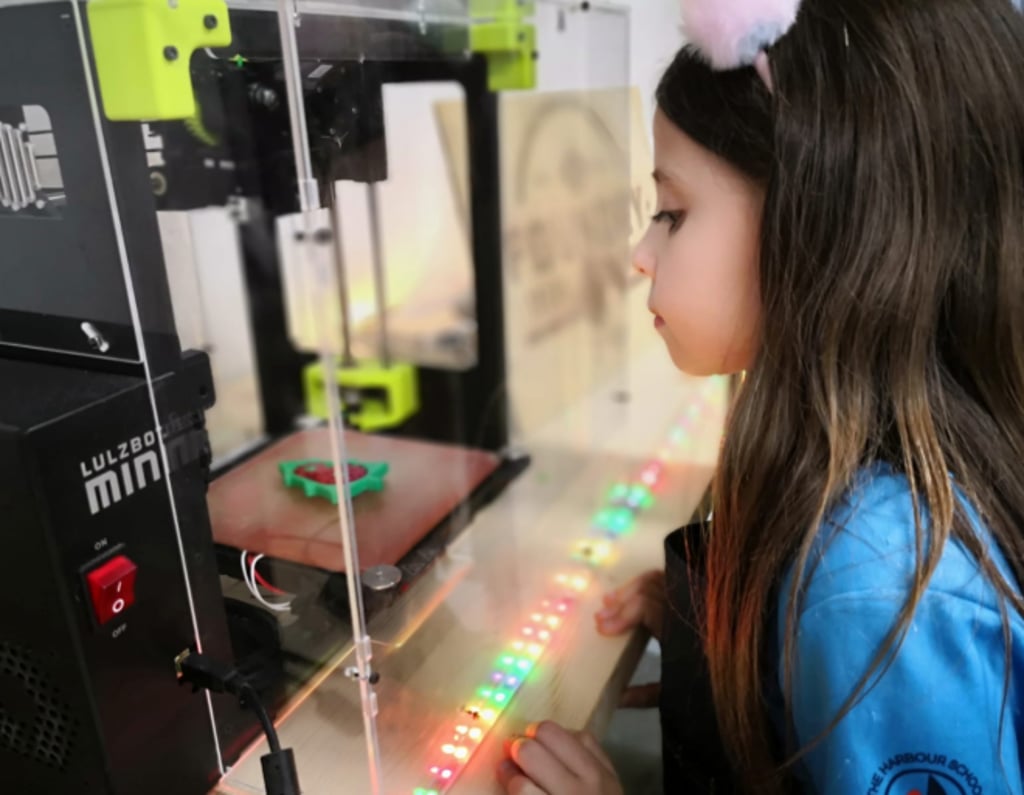A Principal’s Conundrum of Traditional vs. Progressive

[Sponsored Article]
I started working at The Harbour School a year and a half after it was established.
I remember when it was an exclamation point (that’s putting it mildly) for people that I was perfectly happy for my children to learn in classrooms with other children who learned differently from them. Philosophically, my husband and I believed in signing our four children up for a wider range of experiences because school should mirror life.
Over a decade later, I reflect on the shift in our more educated marketplace. Today’s families have done their due diligence- coming to school tours having considered pedagogies and ethos. Quite a few have decided they want something completely different from what they’ve experienced, questioning status quo and the redefining the qualities of a “good” school. No longer is a school good because it “gets” one into college. More often than not, people equate “good” with “progressive” and use the word “progressive” when they really mean relevant. Nevertheless, it made me wonder what factors contributed to this shift in thinking. How is it that, according to many the work we do at THS defines progressive thinking in education today - when our mission has never really changed?
First we travel back to origins. There’s a 300 year genealogy leading to progressive education. Arguably, the most important contributors were the ‘bookends’ of the movement’s roots- the two Johns: Locke and Dewey. Certainly there were others, and John Dewey is generally acknowledged as the “father” of progressive education because of his emphasis on inquiry and experiential learning, but I will dwell on the lesser known John- Locke. Locke was Dewey’s actual thought predecessor by over a hundred years. A master of all trades it seemed, and jack of none, Locke was perhaps more productive in his lifetime than most of us in five- he was a physician, a diplomat, a psychologist, a political adviser and a philosopher.
To fully understand how much of a maverick Locke was for the 17th century, it’s important not to underestimate how poorly children were understood. They were known simply as little adults, which sounds quaint, but really was quite dark. People had absolutely no understanding that there were even mental differences between adults and children and so, children were considered inferior, vile, impulsive parasites- sucking the life from ‘civilisation’s’ teat-, a presence to be tolerated at best. Childhood didn’t exist and thus they had no rights, nor were their interests considered at all, ever.

Enter Edward Clarke, a wealthy landowner. What hasn’t changed between then and now is the luxury of conscientiousness afforded to people who don’t have to worry about the daily grind. Edward approached his friend Locke for advice on raising his son and from their correspondence emerged some of the most important ideas in progressive education as we know it today- Some Thoughts Concerning Education was published in 1693 and considering that childhood didn’t exist, it was a watershed moment that someone of great intellect and respectable social stature published a parenting manual especially as parenting wasn’t even a concept. John Dewey followed over a hundred years later, Maria Montessori was born 170 years later and Dr Spock was published a whopping 260 years later.
Locke published the book for three purposes: medical manual, parenting and teacher instruction guide. I would go so far as to say, this text heralds the beginnings of every teacher pedagogical program that exists today and it begins he says, with understanding children:
"Children are strangers to all we are acquainted with." They must play. Their minds wander. They need to be busy, and they love change and variety. They are naturally curious. To motivate, the skillful teacher simplifies lessons, sympathetically answers naïve questions, seizes the moment when the child is "in tune," engaged, and responsive.”
He also was among the first to advise teachers and parents to consider temperament and physiology during instruction:
"Some men by the unalterable frame of their constitution are stout, others timorous, some confident, others modest, tractable or obstinate, curious or careless, quick or slow."
These are the earliest seeds for individualised methods i. e. Special and gifted education or just plain conscientious teaching, so that instruction delivered considers the receiver and his faculties. This may not be so impressive to us today but remember too that Gregor Mendel, the father of genetics wasn’t even born until over a hundred years later so the fact that this Renaissance man was already suggesting that we needed to pay attention to the physical differences, hinting at cognitive dispositions/differences between children when talking to or teaching them, was light years beyond where the world was at that point.
Other markers that educators generally ascribe to when considering the tenets of ‘progressive education: curriculum with a social conscience; teacher as guide or facilitator as opposed to lecturer; more holistic assessment of skill; and a favorite making the rounds these days- ‘inquiry based learning’ all had their foundations during the 18th-19th centuries. Absolutely nothing is new about them. Why then are we satisfied with calling something that was progressive in 1693, progressive in 2019? You can understand my restlessness with the word- I’ve lately been feeling we’re in a 400 year plateau as far as what progressive looks and feels like in the classroom.

Even the most traditional of traditional schools these days can certainly hit a few of the markers previously outlined: curriculum now usually incorporates some emphasis on social conscience, some type of experiential learning, some aspect with teachers lecturing less. Certainly a very wide range of ‘traditional’ schools would also say they taught students to inquire and ask questions and acknowledged children’s curiosity.
Given there’s technically over a century old normal, or plateau, it’s time to set a higher bar and redefine that which also includes debunking the whole ‘traditional’ vs ‘progressive’ myth. Being considered a ‘progressive school’ is usually a compliment particularly when pitted against ‘traditional.’ The problem though is, that an expanding circle of subscribers accompanies the harsh reality that when everyone is progressive, nobody really actually is.
Progressive as a concept files under ‘common’ knowledge, that is actually quite uncommon. It seems everyone has heard the phrase - no respectable educational textbook, parenting magazine, school forum and 21st century learning aspiration would exclude it- but follow up with what it means, or even better, what it looks like and you’re bound to hear a reply ranging from “it’s the opposite of traditional” to “it’s being, you know, innovative” or “it means doing cool stuff with computers.”
I would argue that tradition was an innovation too, once upon a time, and computers- couldn’t they be harbingers of yet just a more efficient tradition? If I send you a birthday greeting text with an emoji rather than send you a card by mail, does that make me the futurist between us?
The problem I keep running into is that I am an educator. And we educators have an uncanny challenge- we carry the distinction of having the longest in situ training experience (since age 4, age 2 in some circles, even) for any job really, where we toggle back and forth between our considerably flawed collective histories and changing its mechanisms for The Future. In other words, we’re less able to see the forest since we’ve actually spent our formative school age years climbing the trees.
Even more challenging, we’re supposed to be preparing our children for the problems of The Future while our present day, for the most part, finds the majority (at least of schools represented here today) in a cushy land of plenty.
If necessity is the mother of invention, then what happens when everything you need is within your reach? Our “dilemmas” today tend to choices between the $30 Americano or the $45 Frappuccino or knowing the wifi password once landing in a new country. Our daily lives don’t typically require that we problem-solve drought or dying cattle, but navigate the choice between organic eggs or farm raised organic eggs or farm raised eggs in Italy or the ones from a little farm in Provence. Our affluence is enjoyable, but it comes with an insulating effect for us and our children. We are more than fed, pampered, cared for. Social ills are a click away in most of our communities, not on our doorsteps.
One exercise in considering theory is examining its granular application: how might a school that calls itself progressive react to the following typical school scenarios?
-
A scraped knee
-
High School transcript template
-
Invoicing
The mechanisms might be different, but we would generally respond the same as our “traditional” counterparts- at least to certain processes. Is tradition the enemy?
I don’t think traditional is the enemy at all. First of all, “Traditional education” got many of us here. Tradition is Sunday family lunches. Tradition forms some of our most nostalgic moments, about loved ones far or gone and it is sometimes what we yearn for when we are stressed or anxious. For many of our students, the routine that school provides for them conveys safety and affirms trust. Teachers are there for them, are expected to be kind to them, give them the time of day. Teachers give them something to solve, a bandaid when they scrape a knee or a pencil when they need to write. They provide rules and questions and things to consider as well as laughter and something to learn.
Those are all good traditions to be able to give and our schools do that as well as we all can. One can see why, when someone says “progressive is, you know, the opposite of traditional” I have a conundrum.

I found myself going through each one and saying there are times we’ve engaged in pretty much all of these along a continuum depending on the circumstance. It’s actually very, very hard to distinguish between doing the same old thing in a new way and actually doing a new thing. Take a simple skill some of us still teach in school: spelling. What’s the most progressive way to teach spelling?
Some people might think the futurist is the one snorting, “These kids don’t need me teaching them spelling. They have spell check on every device! How 20th century of us to be teaching spelling! I’ll just assign it for homework so at least I don’t have to lie to my Vice Principal if she checks.”
Or is the futurist the one who goes back to John Locke, without realising it and observes the actual only link to the future -- our students -- and figure out from observation, how to serve them better. Whether the technology used is pencil on paper in manila folders or on ipads or slates or written on arms, I’m beginning to think the futurist is the teacher who makes the time to do spelling worth your while by simply meeting you where you’re at which, by the way, acknowledges observing and learning from you: an individualised spelling list.
That is what makes a workplace, a business, a family, a school “progressive” these days. It is not measured in the number of computers you shove in front of the children or the latest 3D printers. Being progressive is understanding that there is as much to learn from each five and ten and seventeen year old as the five and ten and seventeen year old has to learn from us. Whether making admissions policies, course catalogues, history units, faculty PD, menus or uniforms, what causes us to move forward in our organisations is thinking through how our product or experience will be received - whether teacher, student or parent.

Whether it’s a physical fitness experience, a musical, spelling, parent conversation or recess experience- the ask is to be conscientious with each variable we provide.
Cultivating a “human-centered design” task force mentality as a faculty, as an organization is not an easy feat. It goes against the grain of even exchange, of commerce, even of efficiency at times. But if thinking about people when designing chairs deserve it, then what more in thinking about people when designing the future?
Inclusion, not the “breathing the same air, sitting together in the same class” version of inclusion, but “the we’re widening our circle of resources while creating policies and programs with a human-centered design task force” version of inclusion, and progressive go together like peas and carrots. We choose and have a culture where one exists because of the other. Our business of growing human capital, of touching the future, doesn’t stop or even begin with the metric of what can be calculated or read in books. It exists in our understanding of and responses to the people around us.
If we agree that the best way to teach is by example and experience, then we understand it comes with the recognition of having a culture that values a wider range of examples and experiences, one that is demographically learner diverse. Just as resilience isn’t built by the safety of consistency and perfection, and patience isn’t learned with a world ever on time , we don’t teach compassion by never experiencing differences, sadness, or injustice. Bleak is a future with adults whose childhoods discounted the importance of cultivating these qualities.
We want our children happy, and the one thing we know is that happiness is not derived from material known or possessions owned. It’s a feeling we experience from our ability to relate to others. And to teach that effectively, we need to look around us, include and learn from the ‘other’ kids.
About J. Christine Greenberg, THS Prep and Primary Principal
J. Christine Greenberg is the Prep and Primary Principal of The Harbour School in Hong Kong. Before joining the THS faculty in 2009, Christine worked in schools as a teacher and educational consultant. She completed the rank of Master Teacher in accordance with the Comprehensive Application of Behavioral Analysis to Schooling® certification system and was awarded undergraduate degrees summa cum laude in English Literature and Elementary Education (K-8) from the College of Mount Saint Vincent in Riverdale, New York. She completed her graduate studies as a Doctor of Philosophy candidate in the field of Special Education where she was the recipient of the annual scholarship from the Department of Health and Behavior Studies in Education at Teachers College, Columbia University. In 2014, she co-authored a paper on inclusive practices in education in Hong Kong, It Takes Two to Tango, published in the Global Education Review. Her research and professional interests include progressively inclusive education.